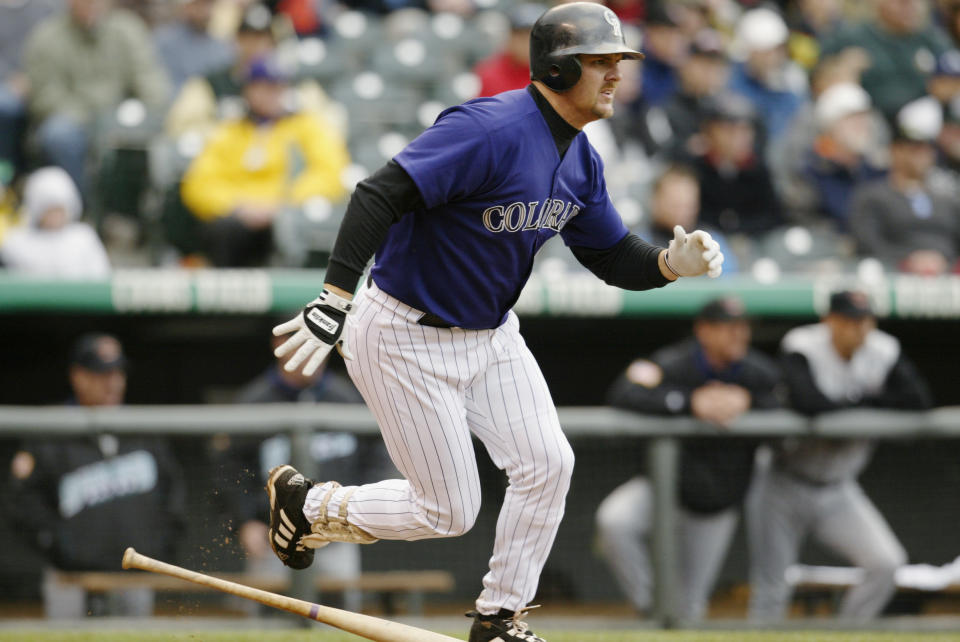Larry Walker finally gets his Hall of Fame moment in final year on ballot

The Baseball Writers Association of America has spoken.
Larry Walker, the five-time All-Star who dazzled fans with his wizardry at the plate, impeccable instincts on the bases, and extraordinary athleticism in the field, is a Hall or Famer.
In his tenth and final season on the BBWAA ballot, Walker received 76.6 percent of the votes. He will officially join Derek Jeter, Ted Simmons and Marvin Miller in the class of 2020.
It's an outcome many feel is long overdue, and one Walker admittedly never thought was coming. That made the call on Tuesday all the more emotional.
Larry gets the call to the Hall. #HOF2020 pic.twitter.com/qDNSipAQsF
— MLB (@MLB) January 21, 2020
Like Tim Raines and Edgar Martinez before him, Walker benefited from a final-year jump on the ballot. Walker finished at 76.6%, an increase of 22 percent from last year. The urgency surrounding his candidacy created a buzz that clearly swayed voters in his direction and got him over the 75 percent required for election.
Not that there ever should have been that much doubt.
Walker was the definition of a five-tool player. He could change the game in every conceivable way, whether it be a home run or stolen base, a diving catch or a strong throw. Those assets made him one of the game's very best all-around players during his prime seasons with the Montreal Expos and Colorado Rockies. And he was still a contributor in his final two seasons with the St. Louis Cardinals.
It all adds up to a Hall of Fame résumé, yet Walker’s case has never been as clear cut as many other players who are referred to in the glowing terms. The reason why is two-fold.
Health and the Coors Field conundrum
First and foremost, Walker was not on the field as often as teams need their franchise player on the field. He was often limited or sidelined by injuries. Over 17 seasons, he appeared in more than 140 games only four times. His frequent absences earned the label of injury prone, which is often times more defining than All-Star, Gold Glove and Silver Slugger Award.
Fairly or unfairly, Walker’s case was also impacted by his time in Colorado. Coors Field, which has been the Rockies home since 1995, is among the most hitter-friendly ballparks in MLB history. It has undeniably elevated hitters and padded stats during its 25-year history. But the question has always been: How much did it aid Walker?
As Chris Bodig of Cooperstown Cred notes, Walker's .865 road OPS rates respectably. Of the 54 players since 1908 to post a career road OPS better than .865 with at least 3,500 road game plate appearances, 31 are in the Hall of Fame. That doesn't include Barry Bonds and Manny Ramirez, whose numbers are Hall of Fame worthy, and it doesn't include Alex Rodriguez and David Ortiz, both of whom are not yet eligible.
Granted, Walker’s 2,160 career hits and 383 home runs are on the low side for a Hall of Fame worthy right fielder. Yes, his best seasons absolutely came while playing in Denver. But there’s more than enough evidence that Walker, when healthy and when playing anywhere other than Coors Field, was an elite level player.
Clean image
Perhaps the biggest factor working in Walker’s favor is an image that was unblemished by steroid accusations or speculation.
Though the vast majority of Walker’s career was played during baseball’s “steroid era,” he steered clear of the drama. With the likes of Barry Bonds, Roger Clemens, Manny Ramirez and Sammy Sosa still on the outside looking in because of their past PED connections, Walker’s path to Cooperstown became a little more clear each year.
Now, while those individuals Hall of Fame legacies remain in limbo, Walker will get to enjoy his moment in the Cooperstown sun this July.
More from Yahoo Sports:


